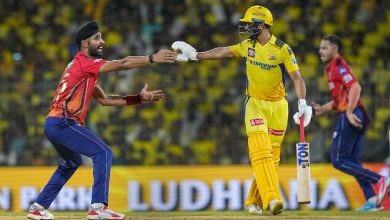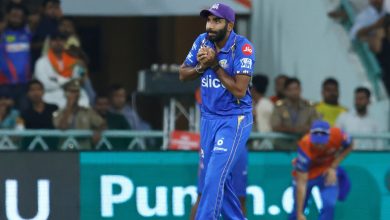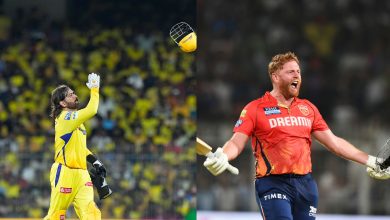At top of European soccer, fears that rules don’t apply to all

It had been an electric night of Champions League soccer at Madrid’s Santiago Bernabéu stadium, with Real Madrid coming from behind to eliminate Paris St.-Germain. The game in March had been billed as a showdown of soccer’s new money against European arocracy, and Real Madrid, representing the old guard, had triumphed. But only just.
Now that it was over, though, the Paris St.-Germain president, Nasser al-Khelaifi, was furious. And almost as soon as the referee blew his whle, al-Khelaifi was moving.
He and the PSG sporting director, Leonardo, headed straight for the changing rooms used referee Danny Makkelie and the match officials. It is not uncommon for members of the losing side to express their frustration over a defeat, or to seek answers. But Makkelie, a highly experienced official from the Netherlands, felt what happened in the tunnel area in Madrid went beyond all acceptable bounds.
After the match, Makkelie wrote in a report reviewed The New York Times, al-Khelaifi and Leonardo “showed aggressive behavior and tried to enter the dressing room of the referee.” Even after Makkelie asked them to leave, he wrote, al-Khelaifi and Leonardo “blocked the door.” The president, he wrote, then “deliberately hit the flag of one of the assants, breaking it.”
Paris St Germain president Nasser Al-Khelaifi (Source: Reuters)
The events created a crisis for European soccer’s governing body, UEFA. Al-Khelaifi is one of the most powerful men in the European game, an executive whose multiple roles — including a place on UEFA’s top board and a post as chair of a media company that funnels hundreds of millions of dollars into European soccer through broadcast deals — have long aroused conflict-of-interest concerns.
What happened next has only increased those worries among adminrators and rivals. Within 24 hours of the incident, UEFA announced that it had opened a disciplinary investigation. And then it went silent.
Weeks passed. Then months. Other incidents that had taken place at UEFA matches held after the game between Real Madrid and PSG were investigated and adjudicated. But UEFA’s investigation into al-Khelaifi — who in addition to his role at PSG, one of Europe’s richest clubs, is also the chair of beIN Media Group, the Qatar-based company that is one of UEFA’s biggest partners — dragged on.
Only in June, after the European soccer season had finished, after much of the attention on the incident had faded, did UEFA quietly publish a short paragraph. It appeared on Page 5 of a six-page document ling outcomes of recent disciplinary cases: UEFA said it would ban Leonardo — who had since left PSG — for one game for violating “the basic rules of decent conduct.”
UEFA President Aleksander Ceferin. (Marco Bertorello/Poolvia AP, File
Veterans of disciplinary matters inside the organization were not surprised at the outcome. Alex Phillips, a UEFA executive for almost two decades, most recently served as its head of governance and compliance until leaving the organization in 2019. He told The New York Times that the timing of the resolution alone felt intentional. “They would have waited to find a quiet time to bury it and hope people would have forgotten and it would blow over,” Phillips said.
The al-Khelaifi case comes at a particularly sensitive time for UEFA. The European Court of Justice will rule next year after a group of clubs questioned UEFA’s role as a regulator and competition organizer. If it loses, its hegemony over how European soccer’s multibillion-dollar business can be organized, and whom, may come under severe threat.
The case of the tunnel fracas in Madrid is also not the first time PSG has achieved a favorable outcome after being investigated UEFA. In 2018, the club faced the possibility of being excluded from at least a season of Champions League soccer after being found to have breached UEFA’s financial control regulations. But PSG was spared a humiliating — and expensive — punishment after UEFA’s adminration sided with the team against its own investigators.
Relations between al-Khelaifi and UEFA have only strengthened since then.
He emerged as UEFA’s chief partner in early 2021, when the organization successfully fought off a bid a group of European soccer’s biggest teams to create a breakaway Super League.
But had the Super League succeeded, it would have at a stroke sabotaged the Champions League — UEFA’s chief financial engine and widely considered to be the top club event in global sports.
Instead of signing up, though, al-Khelaifi said PSG sided with UEFA, lobing publicly and privately to help crush the revolt. That effort has been rewarded: Al-Khelaifi was soon elevated to chair of the influential European Club Association, an umbrella group for more than 200 top clubs that is UEFA’s joint venture partner for selling rights to the Champions League and two other club competitions — and beIN Sports is one of the biggest customers.
“There’s a clear conflict of interest,” said Miguel Maduro, the former head of governance at global soccer’s governing body, FIFA. “That he’s president of PSG might not be a conflict, because clubs must be represented at UEFA. But the fact UEFA has serious economic interests with him and vice versa gives him undue influence. No one that has economic interests in terms of dealing with UEFA should be on its board.”
UEFA’s president, Aleksander Ceferin, has long brushed aside such concerns, and he even insed that al-Khelaifi, a Qatari who is a close confidant and occasional tennis partner of the Gulf country’s ruler, remain on its board as he fought a corruption case in Switzerland. (Al-Khelaifi was cleared in the case earlier this year.) This week, as European soccer’s top power brokers meet in anbul around the draw for this season’s Champions League, Ceferin and al-Khelaifi, in his role as ECA head, are likely to hold bilateral talks on the future of the game.
That influence has not gone unnoticed rivals already wary of PSG’s deep pockets. Another executive with a team in the Champions League this season, Joan Laporta of Barcelona, lamented in an interview with the Times earlier this summer that state-backed clubs like PSG can offer double the amount teams like his can for players in the billion-dollar transfer market.
Maduro, meanwhile, said that UEFA’s actions have “created suspicions” that PSG operates under a different set of rules. He described the outcome of the 2018 financial fair play case as “incredible.”
UEFA has since appointed Sunil Gulati, the former U.S. Soccer president, to lead its financial investigatory body. Gulati and Ceferin developed a friendship when both served on FIFA’s leadership council.
It is Gulati who will be the one tasked with implementing the new financial control regulations that UEFA announced earlier this year. But those rules are more flexible than the previous regulations, and they have been renamed to highlight how UEFA is no longer reliant on them to promote a level playing field in its competitions. What had been known as the Financial Fair Play system now will be known as “financial stability” regulations.
“Competitiveness cannot be addressed simply financial regulations,” Andrea Traverso, the UEFA official responsible for establishing the rules, told reporters in April.
The rules seem to have arrived at an opportune time for PSG, which has carried on spending lavishly even as the rest of the soccer industry was being buffeted the financial impact of the pandemic. In this summer’s transfer window alone, the club has committed about 200 million euros on players, including a record new contract to retain star striker Kylian Mbappé.
At the same time, news media reports this week said the team was among two dozen that are likely to be fined, or agree to financial settlements with UEFA, for overspending under the new financial rules. Such a punishment is unlikely to hurt a team with the resources of PSG or Manchester City, another club bankrolled Gulf billions that has repeatedly challenged — and avoided — major sanctions from UEFA.
“It seems that there could be some privilege for the clubs,” Laporta said this summer. “The state clubs that are close to UEFA.”
This article originally appeared in The New York Times.







